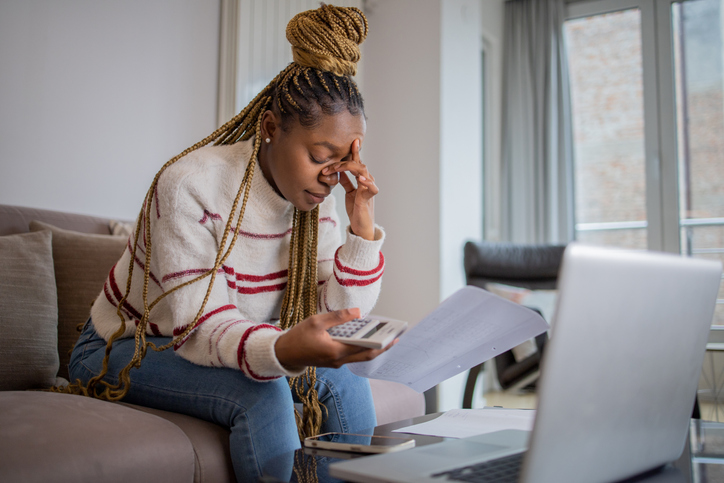5 Basic Human Rights Black People Still Don't Have
Despite Black Joy, There Are 5 Basic Human Rights Black People Still Don’t Have
Share the post
Share this link via
Or copy link

Source: AaronAmat / Getty
California recently announced the formation of a reparations task force, says Cal Matters. The force is dedicated to calculating how taxpayers and government agencies can try to pay Black Americans funds that will somehow help Black people overcome decades of discrimination and oppression. Some argue there is no monetary sum in the world that could possibly undo the injustices experienced by the Black community. But that doesn’t mean the reparations task force isn’t a critical and essential step in the right direction.
These discussions come at an interesting time, with Human Rights Consciousness Week upon us. The definition of human rights is in the name – or at least it should be. Human beings should all – regardless of race, ethnicity, sexuality or other characteristics – have access to certain rights because they are human. But we all know that not all humans do, and that Black people in America still do not enjoy access to certain rights that much of the country so casually and freely experience every day.
A survey by Pew Research found that 4 out of 10 Americans believe that the United States still has plenty of work to do in terms of achieving equal rights for Black people. Human Rights Consciousness Week is a perfect moment to look at some of the heartbreaking statistics about human rights Black people still struggle to see.
Access To Healthy Food

Source: ljubaphoto / Getty
Love MadameNoire? Get more! Join the MadameNoire Newsletter
We care about your data. See our privacy policy.
A healthy diet is one of the pillars of good health. Meanwhile, Black Americans face dietary-related chronic illness including diabetes and high cholesterol at staggeringly higher numbers than other groups. By no coincidence, Black people do not have the same access to affordable nutritious foods that others do.
The majority of food deserts – which are defined as urban areas where it is difficult or impossible to find affordable healthy foods – exist in primarily Black neighborhoods, according to Feeding America. Government agencies are doing little to address this, and more grass roots organizations like this one covered by MADAMENOIRE are having to fill the gap. However, an integral part of having equal rights to something is having government and official authorities recognize the issue and treat it with urgency. When it comes to giving Black people better access to nutritious, affordable foods, that is simply not happening for now.
Protection By Law Enforcement

Source: D-Keine / Getty
For much of America, when a person senses a threat to their safety or even their life, the solution is simple: call the police. However, that is anything but simple for Black people. Ethnically diverse neighborhoods see significantly more police shootings than white neighborhoods, according to BioMed Central. And PBS reports that two-thirds of Black people in America do not trust the police. Knowing that during a dangerous event law enforcement can be trusted to protect and serve the innocent should be a basic human right, but it is not one that the Black community has at this time in history.
A Fair Chance To Succeed

Source: Rockaa / Getty
A chance to leave a legacy and build generational wealth – these are the building blocks of the American dream and the promise of this “free” land. But this country really only keeps that promise to a select few. Access to funding in the form of investment capital and loans is critical to starting a business. But, Forbes reports that Black people are less than half as likely as whites to be approved for a business loan.
Many financial experts say that owning property is the path to generational wealth. However, Black applicants are denied for mortgages at nearly twice the rate that white applicants are. This comes on the heels of decades of racist policies that limited, and at times, even forbade Black people from owning land, aggravating the issue that Black Americans cannot access a wealth-boosting asset like property at nearly the same rate whites do.
Access To Health Care

Source: AaronAmat / Getty
Life is supposed to be a basic human right. Tied into that is a good quality life aka health. However, Black people face chronic illnesses – including preventable ones – at higher rates than other groups. Meanwhile, Black people are nearly twice as likely to be uninsured, making treating these conditions difficult if not impossible at times.
Racist policies and systems make it hard for Black people to access treatment for health issues. And racism is also often the cause of those issues, with Science Direct reporting that experiencing racism can actually increase inflammation in the body, making one more prone to health problems.
The Ability To Protect One’s Children

Source: dragana991 / Getty
It is human nature to have an urgent need to protect one’s children. It’s an undeniable biological drive. But we know that protecting and raising children takes a village, and the village does not show up for Black parents the way it does for others. In fact, CNN reports that 37 percent of missing child cases are for Black children, while Black children only make up 14 percent of children in the U.S. Furthermore, missing cases for Black children are terribly underrepresented in the news.
RELATED CONTENT: Civil Rights Activist Fannie Lou Hamer To Be Honored With Historical Marker In Winona, Mississippi
Related Tags
human rights






